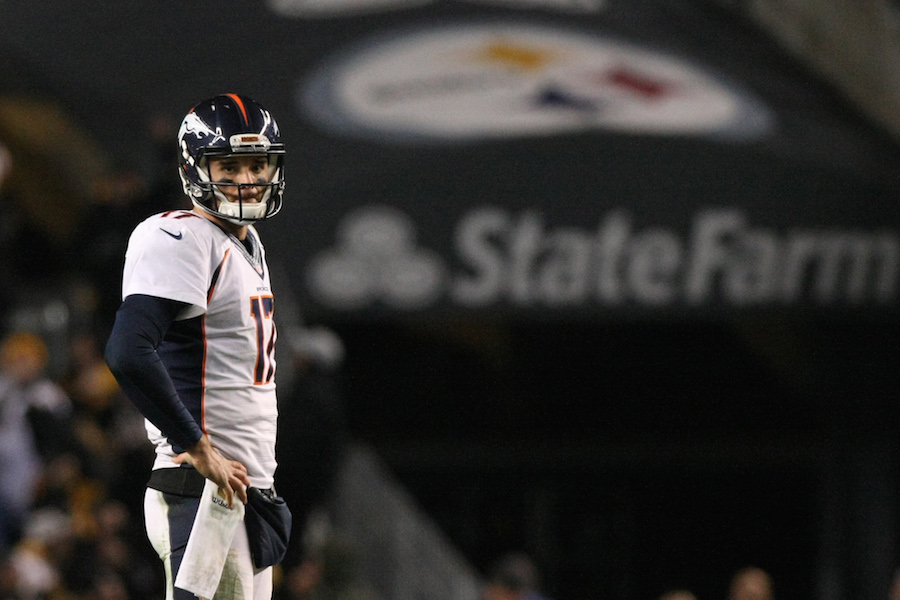Is it really fair to call Brock Osweiler a “game-managing” quarterback any longer?
Is it accurate to classify Gary Kubiak as a “run-first” head coach?
Should we still call the Denver Broncos vaunted defense the “No Fly Zone?”
Some food for thought before answering the aforementioned questions: One game does not a team or player make; nor does one half, for that matter. In the last three weeks, the Denver Broncos have been all kinds of things. The only thing they truly haven’t been is consistent.
Monday morning arrives with plenty of questions after Sunday’s road loss to the Pittsburgh Steelers, a game that seemed to be “in-hand” at various junctures. Some might call the loss devastating; no longer is home field advantage in the playoffs a possibility (New England clinched that yesterday), and winning the AFC West, or making the playoffs at all, are no longer locks.
Even if the Broncos do make the postseason – and they likely still will – this is a team that lacks identity. And they certainly lack the ability to throw a knockout punch when their opponent is on the ropes. While the playoffs are well within reach, “doing anything” is in question.
And back to those questions.
Regarding Osweiler: When the fourth-year quarterback was finally handed the reins against the Chicago Bears five weeks ago, Denver fans lauded him with praise for being the perfect “game manager” to pair with the mighty Denver defense. This was a model that could be referenced, a method that had won plenty of previous Super Bowls – let the defense win the game; just don’t screw it up. And Osweiler did exactly that. Against the Bears he was stellar, earning honors as AFC Offensive Player of the Week, but more importantly, not turning the ball over once.
The very next week, against the New England Patriots, Osweiler was even better. He kept Denver in the game and led a dramatic come-from-behind win. He was safe and clutch. What more could Broncos fans want?
Since then, Osweiler has been a mixed bag. He was great on the opening drive against the Chargers, but failed to score after that. Against Oakland, he didn’t throw any interceptions, but his offense never scored an offensive touchdown, either. Generating only 12 points and taking a safety ultimately resulted in an unexpected home loss. And yesterday, Osweiler was magnificent in the first half. Heading into halftime, Denver led Pittsburgh 27-13; Osweiler was 14-of-18 passing for 214 yards. He’d thrown three touchdowns and ran for another. His quarterback rating of 155.8 was off the charts.
It was the ultimate blueprint for the Broncos: Take a healthy lead into half and let a dominant defense handle the rest. And, of course, do it with your trusty, game-managing quarterback. Keep the ball. Run some clock. Kick a field goal or two. Hop on a flight back to Denver with a convincing win swiped from a hostile environment.
But that’s not what happened. On their first six possessions of the second half, the Broncos were forced to punt. On No. 7, Osweiler did what he couldn’t do, something he’d been flirting with all day. From the Denver 27-yard line, he threw an interception, his third on the season. Three plays later, the Steelers found pay dirt and took a 34-27 lead.
Osweiler had two more chances to tie things up but failed on both occasions, picking up just one first down and turning the ball over on downs each possession.
But the loss certainly can’t be hung on Osweiler alone. Back to our assessment.
Regarding Kubiak: For the past two weeks, the Broncos have been anything but a smash-mouth, physical running team. In those two games, Denver’s playbook reveals 96 passing attempts compared to 46 rushing attempts. The Broncos have tallied just 138 yards while running the football. Against the Steelers, Kubiak’s team lost the time of possession battle, and it showed second half when Denver’s defense surrendered 21 points.
And about that defense: Can a secondary that gives up 380 yards in the air call itself the No Fly Zone? Ben Roethlisberger had his way with Denver. Antonio Brown, the game’s best player on Sunday, torched a combination of Denver defensive backs for 189 receiving yards and two touchdowns.
The excuses, of which there are plenty, some of which are fairly valid.
For Osweiler: Once again, he was plagued by drops. Like a broken record, both Demaryius Thomas and Vernon Davis had significant dropped passes in the game’s most crucial moments. And once again, Osweiler spent far too much time running for his life; on the day he was sacked twice.
For Kubiak: Hey, his offensive line isn’t great; that’s hardly a revelation at this point in the season. They can’t protect their quarterback, so yesterday’s adjustment (which should have been made against Oakland) saw a running back helping in the pass-blocking scheme. It was working, and Osweiler was phenomenal in the first half. Why insist on running when your pass-heavy offense puts up four touchdowns in the first half?
For the defense: These guys are tired. And they’re still banged up all over the field. Furthermore, they came up with a monster stop when Brandon Marshall had an improbable interception with just 2:01 left on the clock. They weren’t great yesterday, but it could be argued that Denver’s defense still did enough to win the game. Pittsburgh – hands down – has the game’s best offense at the moment; the Steelers defense ranks 24th in the league. It’s not fair to ask Denver’s D to do it all, all the time.
So where does it leave the Broncos?
It leaves them without an identity. If the questions about Osweiler, Kubiak and the defense can’t be answered, another – far bigger – question must be asked.
Are these guys contenders, or just pretenders?
